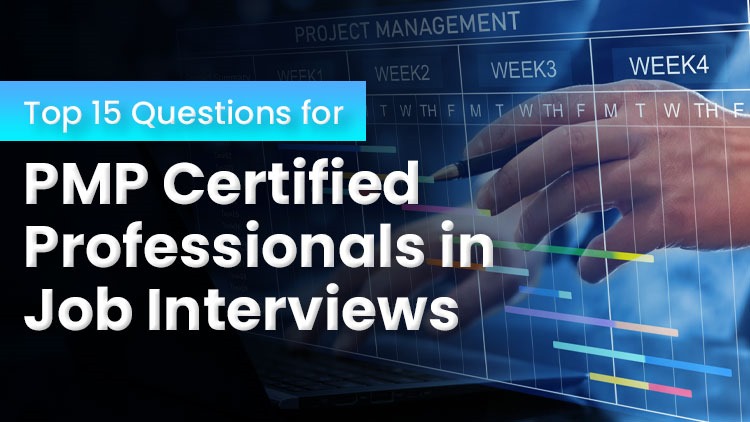
Top 15 Questions for PMP Certified Professionals in Job Interviews

Introduction
Project Management Professional (PMP) certification is one of the most esteemed credentials for project managers, recognized across industries and countries. This certification signifies a professional’s commitment to excellence in project management, understanding of globally accepted methodologies, and capability to deliver successful project outcomes. However, earning the certification is only the beginning. The next critical step is to prove your skills during job interviews. Employers look for theoretical knowledge and practical expertise in handling real-world scenarios. To help you prepare, this blog explores the top 15 interview questions for PMP-certified professionals and offers guidance on responding effectively.
Looking to excel in your project management career? VERSAtile Reads offers resources tailored to PMP-certified professionals and aspiring candidates. From comprehensive practice questions to exam cram notes, we have the tools to help you succeed. Whether preparing for certification or sharpening your skills for job interviews, VERSAtile Reads is your partner in achieving excellence. Explore our resources today and take the next step in your project management journey with confidence!
Benefits of PMP Certification
- Enhanced Career Opportunities: Opens doors to project management roles in various industries.
- Higher Earning Potential: PMP-certified project managers earn higher salaries than their non-certified peers.
- Global Recognition: It is a widely recognized standard that is valuable for international career opportunities.
- Improved Project Management Skills: The certification helps refine your skills in managing and leading projects efficiently.
Top 15 Questions for PMP Certified Professionals
-
Can you explain the significance of the PMP certification in your career?
The PMP certification can be a game-changer for your career. It provides a structured approach to managing projects, enhances your decision-making capabilities, and boosts your credibility among peers and stakeholders. Additionally, it can open doors to global opportunities and enable you to contribute more effectively to your organization’s objectives.
-
What are the five process groups in project management?
The five process groups are Initiating, Planning, Executing, Monitoring and Controlling, and Closing. These groups offer a structured approach to managing projects, ensuring that every aspect is meticulously planned, executed, and evaluated for success.
-
How do you manage risks in a project?
Managing risks involves a proactive approach. Start by identifying potential risks during the planning phase through brainstorming sessions and reviewing historical data. Document these risks in a risk register, prioritize them based on their likelihood and impact, and create mitigation strategies. Regular monitoring allows you to adapt to changes swiftly.
-
How do you handle conflicts within your project team?
Conflicts are inevitable, but handling them effectively requires promoting open communication and understanding each team member’s perspective. Focus on the project’s goals and use techniques like active listening, negotiation, and mediation to find mutually beneficial solutions. The goal is to maintain a collaborative and positive work environment.
-
Can you describe a challenging project and how you managed it?
Managing strict timelines and scarce resources requires a strategic approach. By implementing the Critical Path Method (CPM), tasks were prioritized effectively to ensure that critical deadlines were met. Resources were reallocated dynamically to address high-priority activities, while regular updates were provided to stakeholders to maintain transparency. This focus on project goals and fostering a collaborative team environment enabled the project to be completed on schedule without compromising quality.
-
What tools do you use for project management?
Trello, Jira, and Microsoft Project have proven invaluable for managing tasks, implementing agile workflows, and scheduling project activities. Trello’s intuitive interface facilitates task tracking and collaboration, while Jira supports agile management with features tailored for sprints, backlogs, and issue tracking. Microsoft Project enhances scheduling by providing detailed plans, timelines, and resource allocation tools. Together, these technologies boost teamwork, streamline processes, and ensure effective tracking of deliverables and milestones, leading to well-organized and timely project completion.
-
How do you ensure a project stays within budget?
Start with a detailed cost estimate during the planning phase and track expenditures using Earned Value Management (EVM). Regular financial performance reviews and contingency planning help spot deviations early and keep the project on budget.
-
How do you prioritize tasks in a project?
Leveraging tools like Trello for task tracking, Jira for agile management, and Microsoft Project for scheduling has significantly enhanced project execution. These technologies streamline workflows, improve collaboration among team members, and ensure clarity in task assignments and deadlines. By integrating these tools, teams can expedite processes, maintain transparency, and efficiently track progress toward project milestones. The combined use of these platforms fosters better communication, reduces bottlenecks, and ensures the timely delivery of high-quality outcomes.
-
How do you handle scope creep?
To prevent scope creep, define project requirements clearly at the outset and ensure stakeholder buy-in. Implement a robust change control process to assess any proposed changes and communicate effectively with stakeholders to manage their expectations.
-
How do you ensure stakeholder satisfaction?
Engage stakeholders from the start, ensuring their requirements are documented and addressed in the project plan. Regular updates and progress reports and involving them in key decisions help align their expectations with project goals and ensure satisfaction.
-
How do you measure project success?
You measure success through key performance indicators such as scope, schedule, and budget adherence. Additionally, you assess stakeholder satisfaction, the quality of deliverables, and the project’s contribution to organizational objectives.
-
How do you adapt to changing project requirements?
Adaptation involves conducting a thorough impact analysis of changes, updating the project plan, and communicating adjustments to stakeholders and the team. Agile methodologies are useful in responding to evolving requirements without compromising project goals.
-
What is your experience with Agile methodologies?
Extensive experience with Scrum and Kanban has enabled effective project management tailored to specific needs. Adopting Scrum fostered enhanced collaboration and accelerated delivery through well-defined sprints and regular team interactions in one project. In another, Kanban proved instrumental in streamlining workflows, visualizing tasks, minimizing bottlenecks, and ensuring a continuous and efficient workflow. Each methodology was strategically applied to maximize team performance and achieve project goals.
-
How do you motivate your project team?
You inspire your team by praising individual efforts, creating a positive work atmosphere, and promoting professional growth. Setting attainable goals and providing regular feedback support engagement and morale maintenance.
-
How do you manage project timelines?
You manage timeframes by making thorough schedules with Gantt charts and prioritizing important work using the Critical Path Method. Frequent milestone reviews and status reports enable you to monitor developments and proactively handle setbacks.
Conclusion
Being a PMP-certified professional demonstrates your ability to manage complex projects successfully. However, articulating your expertise in job interviews requires preparation and confidence. By familiarizing yourself with these common interview questions and practicing thoughtful responses, you can showcase your skills and stand out as a top candidate for project management roles.
FAQs
-
Is PMP certification necessary for all project management roles?
While not mandatory for all roles, the PMP certification is highly valued in industries prioritizing structured project management practices and global recognition of expertise.
-
How can we Effectively prepare for a PMP job interview?
Study the PMBOK Guide, practice behavioral and technical questions, and be ready to discuss how you’ve applied project management principles in real-life scenarios.
-
What industries value PMP-certified professionals the most?
Industries such as IT, construction, healthcare, and finance highly value PMP-certified professionals for their ability to handle complex and high-stakes projects.
- Published Date:



